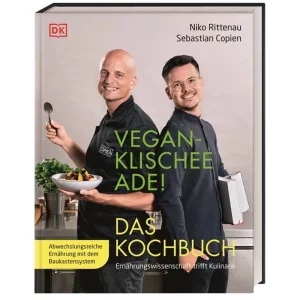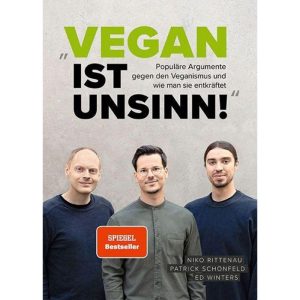Is a vegan diet healthy or not? If you're looking for an answer to this question, you've come to the right place! More and more people are deciding to consume fewer or no animal products for health reasons.
However, we often hear and read that a purely plant-based diet provides too little protein, iron and vitamin B12 - and that it is not recommended for athletes, children and pregnant women. And anyway: our teeth are actually made for eating meat - Humans are simply carnivores. Such prejudices make many people doubt.
In this article, I would therefore like to provide you with everything you need to know about the health benefits of a vegan diet. Among other things, you'll find out if and when veganism is healthy - and which nutrients vegans and vegetarians should pay particular attention to. Let's go!
Here is a brief overview of the article in advance:
- From a medical and scientific point of view
- Prevent common diseases
- Vegan food pyramid
- Potentially critical nutrients
- In certain phases of life
- Regular blood tests
- Health of other people
- Closing words
Notice: This article is not a substitute for medical advice, but merely provides general information about health on a vegan diet. Please consult your doctor if you feel unwell or want to prevent health problems with medical care.
Is veganism healthy from a medical and scientific point of view?
The most important thing first: According to of this study American Dietetic Associationthe world's largest organization of more than 70,000 nutrition professionals, researchers and physicians, is a balanced planned vegan diet healthy and nutritionally appropriate and also provides health Advantages in the prevention and treatment of certain diseases.
According to the study, the plant-based diet is suitable for people in all phases of the life cycleincluding pregnancy, breastfeeding, infancy, childhood and adolescence, as well as for athletes.
The Australian1 and Canadian nutrition organization2and the British state healthcare system3 have affiliated with this position.
Vegans have a lower risk of common diseases
The study by the American Dietetic Association also showed that the Probability for working on typical nutrition-related widespread diseases to fall ill is significantly lower among vegans and vegetarians compared to meat-eaters.
These include above all
- Heart disease (see Prevent heart disease)
- Cancer (including colorectal cancer, stomach cancer, prostate cancer and pancreatic cancer)
- Type 2 diabetes (see Preventing type 2 diabetes)
- Hypercholesterolemia (high cholesterol levels in the blood)
- Overweight and obesity
- Osteoporosis
- Arthritis
- Gout
- Hypertension
With a well-planned, plant-based diet, the Minimize the risk of these diseasesavoid overuse of the body with expensive synthetic drugs and to prevent the Increase life expectancy.
Tip: Detailed information about the Increased life expectancy with a vegan diet in the linked blog article.
It should also be added that the Danger of antibiotic resistance is significantly higher for meat eaters, as this study has shown. This means that in an emergency, antibiotics could be ineffective in those affected. This is due to the Increased value of antibiotic-resistant germs in the body on the Use of antibiotics in industrial livestock farming.
It is also important to know that 5,000 years ago almost everyone was lactose intolerant was - and that this is an indication that we humans, by nature, are actually No infant milk from another species tolerate. Today, around two thirds of all adults worldwide cannot digest lactose. In Germany the figure is around 15 percent and in some regions of East Asia it is as high as 90 percent. Diarrhea, abdominal cramps, flatulence and nausea are among the typical symptoms.
Vegan food pyramid for a balanced plant-based diet

"Just eat a balanced diet" is easy to say! So what is on the plate of a healthy vegan? Fortunately, scientists from Giessen have developed the vegan food pyramid, which is wonderful for orientation as it shows the most important food groups and consumption recommendations.
Providing the basis Water and of course fruit and vegetables which provide our body with important vitamins, minerals and a particularly high amount of fiber - and promote helpful microorganisms in the intestine.
Then follow Wholemeal products and potatoes. Important for a healthy vegan diet are of course also Nuts and seeds, Legumes and others Vegetable protein sources (e.g. lentils, beans, pumpkin seeds and soy), and Vegetable milk alternatives (e.g. oat or soy milk) and Vegetable fats and oils (e.g. olive, walnut and linseed oil).
At the top of the pyramid Snacks, sweets and alcohol - In other words, things that should not be enjoyed at all or only in moderation.
Print out the pyramid: You can download the vegan food pyramid from the Albert Schweitzer Stiftung für unsere Mitwelt Download as PDF for printing and hang them on your fridge. 🙂
Critical nutrients in a vegan diet
Basically, with a well-planned dietary change No nutrient deficiency to be expected that could endanger health. Nevertheless, according to Position paper of the German Nutrition Society (DGE) certain potentially critical nutrients that vegans should pay particular attention to when making the switch. These include:
- Vitamin B12: In sufficient quantity comes Vitamin B12 is only found in animal foods. The vitamin is often added to animal feed. Vegans should definitely take vitamin B12 from food (is available here*) supplement.
- Omega-3 fatty acids: The healthy Omega-3 fatty acids are found primarily in fish. But they can also be obtained from plant products such as algae, rapeseed oil, flaxseed and walnuts.
- Vitamin B2: Meat, fish and dairy products are usually rich in Vitamin B2. Vegans can also get it by eating nuts, seeds, mushrooms or pulses.
- Calcium: Cow's milk, yogurt, cottage cheese and cheese are rich in Calcium. Vegans can also get the mineral from broccoli, sesame seeds, spinach leaves, kale or soy milk.
- Iron: Liver or egg yolk contain much Iron. In the vegan diet are recommended in terms of intake nuts, legumes, pumpkin seeds, flaxseed and oatmeal.
- Zinc: Beef, pork and poultry contain large amounts of Zinc. The trace element can also be obtained from lentils, oatmeal, pumpkin seeds and wholegrain products.
- Iodine: Most people cover their daily requirement of Iodine via fish. However, dulse algae or nori algae and the consumption of iodized salt also make this possible for vegans.
- Vitamin D: The Vitamin D is mainly found in animal foods such as salmon, herring and egg yolk. It can also be found in plant-based foods such as chanterelles and mushrooms. However, our body generally produces the vitamin on its own as soon as the sun's rays hit the skin. In the dark, sunless season, vegans - but also mixed dieters - should supplement the vitamin to be on the safe side. (is available here*)
Tip: At Dietary supplements for vegan diet you will find more detailed information on this topic.
Vegan diet in the different stages of life

I had already indicated at the beginning that Many people believethat Veganism can be harmful to our health in certain phases of our lives, such as during pregnancy.
I would therefore like to provide you with some important information on vegan nutrition at certain stages of your life, which can DGE recommends.
Vegan diet during pregnancy
During pregnancy and breastfeeding, the mother's nutrient requirements increase as she is also caring for the baby. Ideally, during this time nutrient dense foods be eaten.
A vegan diet during pregnancy and breastfeeding can be advantageousas it contains less saturated fat, more fiber, many phytochemicals and antioxidants, as well as a higher nutrient density.
During pregnancy, the need for beta-carotene, vitamins B2, B6, B9, B12, vitamin D, iron, iodine and zinc increases. The DGE has vitamin D, iodine and iron regardless of the form of nutrition are defined as potentially critical nutrients.
The Nutrient requirements during pregnancy is enclosed:
For vegans the DGE has defined vitamin B12, calcium and essential fatty acids (EFAs) as potentially critical. During pregnancy, the following reference values should be supplied:
- Vitamin B12: 450 µg/day
- Calcium: 1000 mg/day
- EFAs: 2.5 % of calories from linoleic acid, 0.5 % from alpha-linolenic acid.
Veganism for children and teenagers
Nutrition in childhood is the foundation for the child's later eating behavior. This is where the "operating system" is developed, so to speak. It therefore makes particular sense to Healthy and tasty food with lots of fruit and vegetables to set.
Nutrients to pay special attention to during this time are: Protein, folate, vitamin B12, iron, calcium, zinc, essential fatty acids and vitamin D.
As soon as girls have Menstruation the iron requirement increases, so that a distinction must also be made here depending on gender. With a well-planned plant-based diet and vitamin B12 supplementation (is available here*) and vitamin D (is available here*), the nutrient requirements needed for growth and development can be well covered.
Vegan diet for athletes
Depending on the type of sport, intensity and duration, the need for energy and nutrients can increase for athletes. Increased sweating increases the need for calcium, iron, zinc and iodine in particular. Magnesium is particularly important for muscle function. And vitamins B1, B2, B3 and B6 are particularly important with an increased energy and protein intake.
Vegan athletes should pay particular attention to their intake of iron, zinc, iodine and vitamin B2. A balanced plant-based diet, supplemented with supplements if necessary, can safely cover the nutrient requirements. Other nutrients such as magnesium, calcium and vitamins B1, B3 and B6 are generally not a problem in a plant-based diet.
Tip: Just in Diet phases you should particularly focus on nutrient-dense foods to ensure you get enough micronutrients. A plant-based diet is ideal here due to its lower calorie content on average and the large number of vitamins and minerals.
Veganism in old age
A vegan diet is also a good option for senior citizens in order to stay fit in old age.
While the need for micronutrients remains the same for senior citizens, the energy requirement decreases. This is why the high nutrient density of plant-based foods. The high proportion of fiber also ensures a healthy bowel movement and can thus prevent constipation.
Vitamins D, B9 and B12, iron, magnesium, iodine, Seleniumchromium, calcium and zinc should be particularly monitored in old age, regardless of the type of diet.
Due to the reduced feeling of thirst, care should also be taken to ensure sufficient fluid intake. For vegan seniors, vitamin D, B12, iron, iodine, selenium and zinc are particularly relevant.
Good to know: Malnutrition in old age can be caused by loss of appetite as well as chewing and swallowing disorders. Mental limitations, e.g. confusion or dementia, psychological problems such as depression, social changes and financial problems can also contribute to so-called old-age anorexia.
Regular blood tests are important
Personally, I've been vegan for many years and do Regular blood tests (Click here for the Vegan Nutrient Check*) to ensure that I also take in the potentially critical nutrients in sufficient quantities. This is highly recommended, especially in the early days.
In my case was neither with my General practitioner still about the Check from Lifelab* I haven't found a single nutrient deficiency so far - and I also feel fitter than before.
To avoid endangering your health, you can use your Have a professional nutritionist support you in changing your dietthat specialize in vegan/vegetarian nutrition.
Veganism also promotes the health of others

Not all people can meet their nutritional needs purely veganas in some regions there is a lack of access to diverse plant-based cuisine or seasonality restricts what is available. But This is not a problem in Europe. And every person who eats a vegan diet also promotes the health of everyone on the planet.
Because veganism affects even the largest Environmental problems of our time againstthat directly affect all or very many people. For example the Climate Changethe increasing Extreme weather, the Deforestation of the rainforests, the Species Extinction, the Air Pollution, the Water Shortage and last but not least the World Hunger.
The health aspects of the plant-based diet without the "detour animal". therefore not only serve your own health and the health of animals, but also the health of other people and future generations on this planet.
Veganism is more than health: Many people become vegan for health reasons. There are also ecological and, above all, ethical reasons for going vegan. steadily growing number of vegans care. You can find out more about this at Reasons to live vegan.
A balanced vegan diet is healthy
You can't make a blanket claim that vegan healthy or unhealthy be. Of course, the same also applies to eating meat.
However, science, research and medicine have proven that a balanced vegan diet Be healthy in all phases of life, at the healthy slimming help and even prevent serious diseases. The emphasis is on the word "balanced". Because chips and cola are also vegan and anything but healthy.
One good start into the plant-based kitchen with the cookbook "Vegan & Easy" by Bianca Zapatka*.
Finally, I would also like to introduce you to the motivating, further-reaching films "What The Health" (is available here on DVD*) and "The Game Changers" (is available here on DVD*), which you can also watch on Netflix.
Apart from the love for my own body, I am personally motivated above all by Ethical reasons for a plant-based diet. There are simply no moral and vital reason for consuming animal products. We should all ask ourselves why we continue to consume the body parts of cows, pigs or chickens when there are not necessary and also harmful to health is.
"Reason starts in the kitchen."
Friedrich Wilhelm Nietzsche (more at Diet quotes)
Do you have any questions, suggestions or further information about the health benefits of a plant-based diet? Then I look forward to your comment.
Stay healthy,

PS: You now want start into vegan life? In the linked article there are the most important tips!
References:
- Albert Schweitzer Stiftung für unsere Mitwelt: Australia recognizes vegan diets as healthy (as of 14.07.2013), available at https://albert-schweitzer-stiftung.de/aktuell/australien-vegane-ernaehrung-gesund. [28.01.2025]. ↩︎
- American Dietetic Association; Dietitians of Canada (2003): Position of the American Dietetic Association and Dietitians of Canada: Vegetarian diets, https://pubmed.ncbi.nlm.nih.gov/12778049. [28.01.2025]. ↩︎
- National Health Service (NHS): Vegetarian or vegan and pregnant (as of 08.08.2018), available at https://www.nhs.uk/pregnancy/keeping-well/vegetarian-or-vegan-and-pregnant. [28.01.2025]. ↩︎









